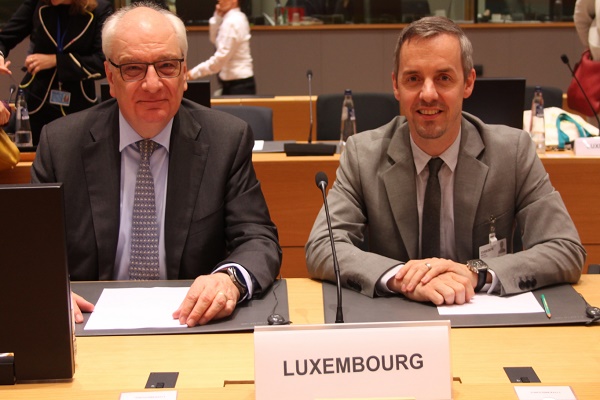 L-R: Guy Arendt, Secretary of State for Culture; Georges Mischo, Mayor of Esch-sur-Alzette;
Credit: MCULT
L-R: Guy Arendt, Secretary of State for Culture; Georges Mischo, Mayor of Esch-sur-Alzette;
Credit: MCULT
Luxembourg State Secretary for Culture Guy Arendt participated yesterday in the Council of Ministers and Heads of Culture of the European Union in Brussels.
On Wednesday 23 May 2018, as part of his culture training, Guy Arendt took part in the Education, Youth, Culture and Sport Council in Brussels.
In the context of the European Year of Cultural Heritage 2018, the Bulgarian Presidency of the Council has emphasised heritage and the need to highlight this in EU policies. The ministers have therefore adopted conclusions on the subject that call for making cultural heritage a strategic objective when developing and implementing other EU policies.
The Council of Culture Ministers also held a policy debate on a long-term vision for the contribution of culture to the EU after 2020, the pivotal year in which the next multiannual financial framework of the EU will be decided. Ministers therefore agreed that culture must be a real driver of change in the EU after 2020.
In his intervention, Guy Arendt also stressed more specifically that any measure that will be taken in this context should be closer to the actors and that the next programme "Creative Europe" will have to recognise, take into account, respect and provide necessary space for the role and specific needs of culture.
Luxembourg also presented at this meeting "Esch-sur-Alzette, European Capital of Culture 2022". Accompanied by the mayor of Esch-sur-Alzette, Georges Mischo, the State Secretary for Culture Guy Arendt recalled that it was the third time that Luxembourg proposed a European Capital of Culture, with emphasis on the cross-border nature of the project, and reiterated the full support of the Luxembourg government in Esch 2022. Subsequently, Mayor Georges Mischo outlined to ministers the context and vision of his city and the partner municipalities for the European Capital of Culture 2022, whose European dimension is not only the basis for but also an objective in bringing people closer, combating prejudices and strengthening social cohesion, which are eminently European concerns.








